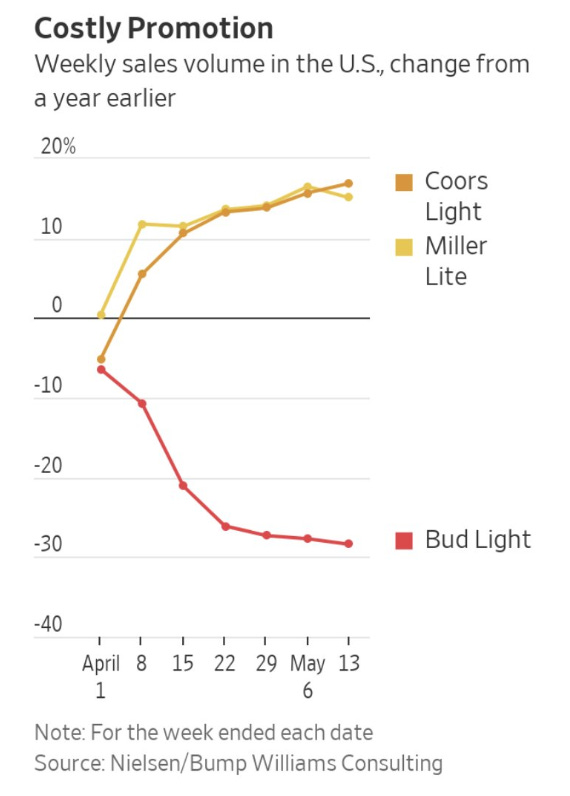Jon Militmore on the threat to the corporate world of ESG-guided action posed by mere “consumers” with their “choices”:
The Wall Street Journal ran a deep dive article last month exploring “how Bud Light blew it”, but it somehow missed the most important part of the story.
As most people already know, the world’s most popular light lager has seen a collapse in sales following a boycott prompted by a March Madness ad campaign featuring transgender influencer Dylan Mulvaney. The Journal‘s chart depicting the fall in Bud Light sales speaks for itself, and the company’s delayed and tepid response to the uproar only seemed to make matters worse.
This isn’t Anheuser-Busch’s first foray into controversial social issues.
The Journal‘s Jennifer Maloney points out that the company has been engaging in social equity-themed advertising for years, including a 2021 Michelob Ultra ad featuring transgender track star Cecé Telfer and a 2022 Bud Light Canada campaign for Pride Month displaying various pronouns.
What Maloney fails to mention in her article is why beer companies — not just Bud Light — are suddenly courting controversial social issues such as nonbinary gender, transgenderism, and third-wave feminism.
The answer is simple: The rise of environmental, social, and corporate governance as the dominant strain of “stakeholder capitalism” has incentivized corporations to curry favor with ESG rating firms, even if it means alienating their consumers.
Unlike traditional capitalism, which seeks to maximize profits by serving consumers, the ESG model seeks to “improve” capitalism by considering other stakeholders besides investors and consumers. Publicly traded corporations are graded on how well they achieve socially desirable metrics, such as combating climate change, advancing diversity and inclusion, and creating a more “equitable” society.
What was intended to be a kinder, gentler form of capitalism has morphed into a kind of economic fascism that places the arbitrary interests of a small cabal of people — asset managers, bureaucrats, global financiers — ahead of consumers.
As the Austrian economist Ludwig von Mises pointed out, consumers are the true bosses in a capitalist system. They ultimately decide what products are created and purchased, who becomes wealthy, and who becomes poor.
As the Bud Light fiasco shows, ESG places consumers in the back seat. The social equity campaigns are not designed to appeal to Bud Light consumers, but to the ESG rating agencies, which have the power to downgrade companies that fail to dance to their tune.




